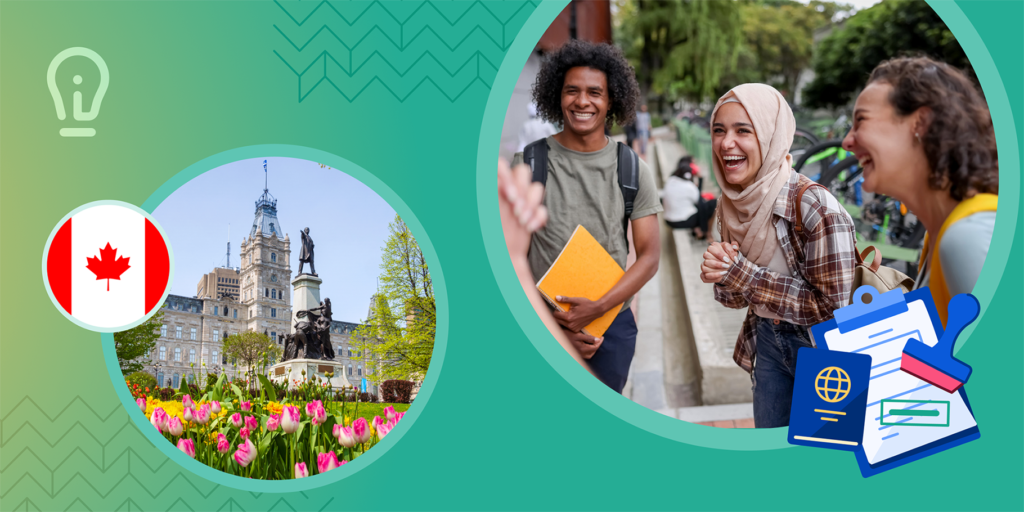Student visa1 processing times2 are a top concern among students looking to study in Canada and the recruitment professionals helping them get there. Last year, we looked at how processing times were impacted by the pandemic, and what this meant for students.
Want to know how long your study permit application could take to process so you can plan ahead for your study abroad journey? Today we’ll be diving into Canadian study permit processing times in 2021 through to mid-2022.
Key Insights at a Glance
- New study permit processing times for international students in 2021 are beginning to converge across countries.
- In 2021, the average study permit processing time was 80 days.
- Study permit processing times for Thai students averaged just under five weeks in 2021.
Study permit processing times are typically calculated by source country. In this article, we’ll look at processing times for three of the largest source countries for international students to Canada: India, Nigeria, and the Philippines. We’ll also be taking a closer look at Thailand, which has changed significantly compared to last year. Let’s dive in!
Average Student Visa Processing Times in 2021
A number of factors can affect processing times, from how many applications IRCC receives, to how easily they’re able to verify a student’s information, to how long a student takes to respond to requests and concerns. Another factor that can influence processing times is a student’s nationality, with diverse government sources contributing to the complexities of validating student visa documents.
As travel restrictions eased and government offices reopened in 2021, study permit processing times improved compared to 2020, hitting a low of eight weeks in July 2021. However, processing times have since ticked back up.
The chart below shows the average study permit processing times for all countries:
The average processing times right now are down from their peak in November 2021, although they are well above where they were last summer.
In early 2022, the average processing time for all students was 80 days, just above the average of 77 days in 2021. Countries such as Jamaica, Pakistan, and Brazil saw an average improvement of over 10 weeks in the first half of 2022 when compared to 2021 levels.
Student Visa Processing Times by Country, 2021
The chart below shows the average study permit processing times for Nigerian, Indian, Filipino and Thai students from February to December 2021:
Despite the increase we saw in processing times in 2020, new study permit processing times for international students showed considerable volatility across many countries in 2021.
Thai students experienced the shortest processing times of any country in 2021. Despite an increase in study permit processing times for Thai students, wait times averaged just under five weeks in 2021. In April of 2021, study permit processing times for Thai students dropped to as low as two weeks. From April to December of 2021, this number increased to 6 weeks.
Study permit processing times for Indian students continued to drop from April to August 2021. Processing times for Indian students reached levels as low as three and a half weeks, representing a drop of over eight and a half weeks in just five months. However, from August to November of 2021, Indian students saw a considerable increase in study permit processing times, with processing times reaching a high of just over 24 weeks in November.
Filipino students saw a significant drop in processing times. In 2021, study permit processing times for Filipino students dropped from 14 weeks in March to 8 weeks in November.
While some countries’ wait times are decreasing, others remain high. Nigerian study permit processing times increased steadily. From May to December 2021, study permit processing times for Nigerian students averaged 21 weeks, with a spike in processing times in December.
Student Visa Processing Times Stabilizing in 2022
In late 2021 through to mid-2022, study permit processing times for students for select source countries are showing signs of convergence. The chart below shows the average study permit processing times for Nigerian, Indian, Filipino, and Thai students from August 2021 to July 2022:
Study permit processing times for Nigerian students increased slightly at the beginning of 2022, with Nigerian students waiting as long as 27 weeks for their study permits to be processed. But they’ve since fallen dramatically, falling below 18 weeks in July.
It’s been encouraging to see the average study permit processing times for Nigerian students drop. However, processing times for Nigerian students remain 50% higher than the average. From speaking with our recruitment partners in Nigeria, we know this is a key pain point for Nigerian students as they look to embark upon their Canadian student journey.
Indian student study permit processing times averaged 12 weeks across the first half of 2022. Following a spike in study permit processing times in November of 2021, study permit processing times for Indian students were fairly steady in the first quarter of 2022, and have increased slightly into the second quarter.
In 2021, Filipino students saw processing times averaging 10 weeks, with a slight uptick to 11 weeks in the first half of 2022. In January and April of 2022, average processing times dropped to as low as 9 weeks for Filipino students.
Thailand saw a notable increase in study permit processing time from 2021 to 2022. From January to June of this year, Thai students saw an increase of just over 2 weeks in study permit processing times, with wait times reaching as high as 13 weeks in July of 2022. This was almost three times longer than the average student permit processing time from July of last year, where processing times were at a low of 4 weeks.
Looking Forward
Study permit processing times are beginning to converge across select countries, following several surges in 2021. Many international students can expect shorter decision wait times in 2022 from 2021. We expect that processing times will continue to converge, with the backlog of applications from pandemic levels beginning to clear.
While we are encouraged by numbers moving in the right direction, and are hopeful that the government will continue to work on this, we understand that there is still more work to be done. Rapid study permit processing times are critical for Canadian institutions, with students from growing markets turning to Canada to begin their study abroad journey.
Schools looking to help decrease permit processing times should:
- Utilize a document verification platform such as ApplyProof to ensure student visa application letters and documents can be validated quickly and securely.
Recruitment partners looking to lower decision wait times should:
- Organize all necessary documents to include with the study permit application at the time of submission.
- Keep track of current study permit processing times to better prepare for your study abroad journey by understanding how long processing might take.
- Look out for email communication from IRCC about any additional documents that may be required.
Subscribe to ApplyInsights
Sign up for the latest insights on international education.

About the ApplyInsights Team
FOOTNOTES:
1. The terms student visa and study permit are generally used interchangeably for Canadian international students. Rather than student visas, Canada provides accepted international students with study permits, which allow those students to enroll in classes at Canadian institutions. When a student is accepted for a study permit, they are also usually provided with a visitor visa, which allows that student to enter Canada for their studies. Statistics used in this article are for new study permits only. All data courtesy of Immigration, Refugees and Citizenship Canada (IRCC), except where noted.
2. Processing times for students from each source country are calculated by the IRCC on an eight-week rolling basis. Each week, the presented processing time accounts for the average number of calendar days from student submission to IRCC decision rendered on 80% of all applications that received a decision from the IRCC in the previous eight-week period. Weekly averages are then averaged over each month to obtain monthly averages.



